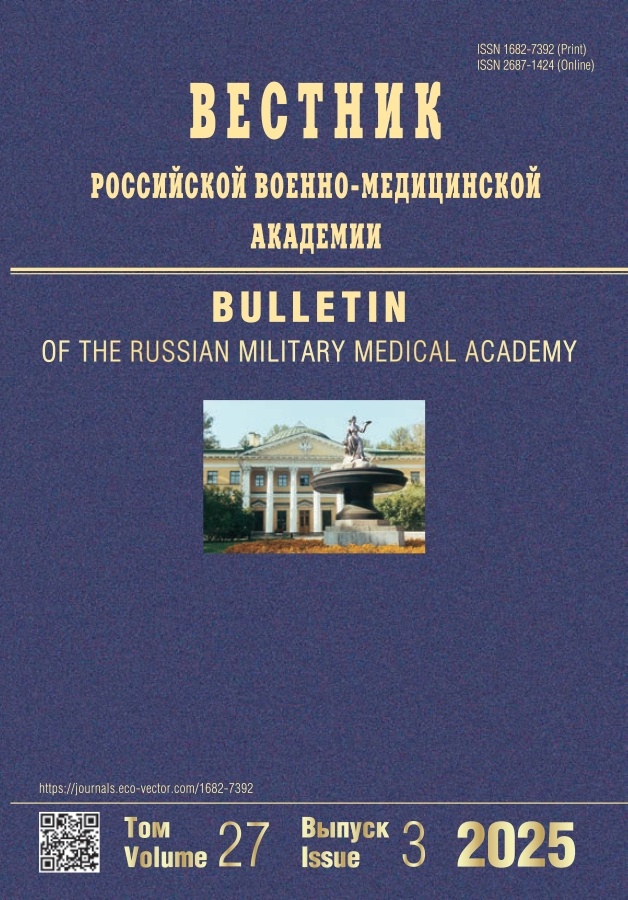The role of blood loss in the structure of thanatogenesis factors in explosive injury during peacetime
- 作者: Trukhan A.P.1, Samokhvalov I.M.2, Tolmachev I.A2, Isakov B.D.3, Golovko K.P.2, Skakunova T.Y.2, Ryadnov A.A.2
-
隶属关系:
- 432nd Main Military Clinical Medical Center
- Military Medical Academy. S. M. Kirov
- Bureau of Forensic Medicine
- 期: 卷 22, 编号 2 (2020)
- 页面: 66-69
- 栏目: Articles
- URL: https://journals.rcsi.science/1682-7392/article/view/50048
- DOI: https://doi.org/10.17816/brmma50048
- ID: 50048
如何引用文章
全文:
详细
Currently, explosive trauma is rare in peacetime injury surgery, but is of great importance in the work of surgeons. This is due to damage of a large number of anatomical areas, various damaging factors of the explosion and the simultaneous entering of several victims. The results of forensic medical examinations of 24 corpses of people who died as a result of terrorist acts in the subway of Minsk on 11/04/2011 and St. Petersburg on 03/04/2017 were analyzed. Incompatible with life injuries as the immediate cause of death were found only in 33,3% of cases. Profuse blood loss was the immediate cause of death in 66,7% of those killed. The most common (in 87,5% cases) cause of profuse blood loss was internal bleeding: in 7 (50%) cases - due to damage to organs and large vessels of the chest, in 6 (42,9%) cases - due to combined damage to the anatomical structures of the chest and abdomen, in 1 (7,1%) case - due to damage to the parenchymal organs of the abdominal cavity and retroperitoneal space. The leading role in thanatogenesis during the considered explosive peacetime injuries was occupied by blood loss, its specific gravity was 66,7%. Profuse blood loss in 87,5% of cases was due to damage to the organs of the chest and abdomen. Potentially salvable were 7 (29,2%) dead who received damage to the main vessels of the limbs, damage to internal organs without injuring the heart and large blood vessels. Thus, the development of new ways to stop intracavitary bleeding at the advanced stages of medical care for victims with explosive injuries and injuries is a priority aim.
作者简介
A. Trukhan
432nd Main Military Clinical Medical Center
编辑信件的主要联系方式.
Email: vmeda-nio@mil.ru
俄罗斯联邦, Minsk
I. Samokhvalov
Military Medical Academy. S. M. Kirov
Email: vmeda-nio@mil.ru
俄罗斯联邦, Saint Petersburg
I. Tolmachev
Military Medical Academy. S. M. Kirov
Email: vmeda-nio@mil.ru
俄罗斯联邦, Saint Petersburg
B. Isakov
Bureau of Forensic Medicine
Email: vmeda-nio@mil.ru
俄罗斯联邦, Saint Petersburg
K. Golovko
Military Medical Academy. S. M. Kirov
Email: vmeda-nio@mil.ru
俄罗斯联邦, Saint Petersburg
T. Skakunova
Military Medical Academy. S. M. Kirov
Email: vmeda-nio@mil.ru
俄罗斯联邦, Saint Petersburg
A. Ryadnov
Military Medical Academy. S. M. Kirov
Email: vmeda-nio@mil.ru
俄罗斯联邦, Saint Petersburg
参考
补充文件







